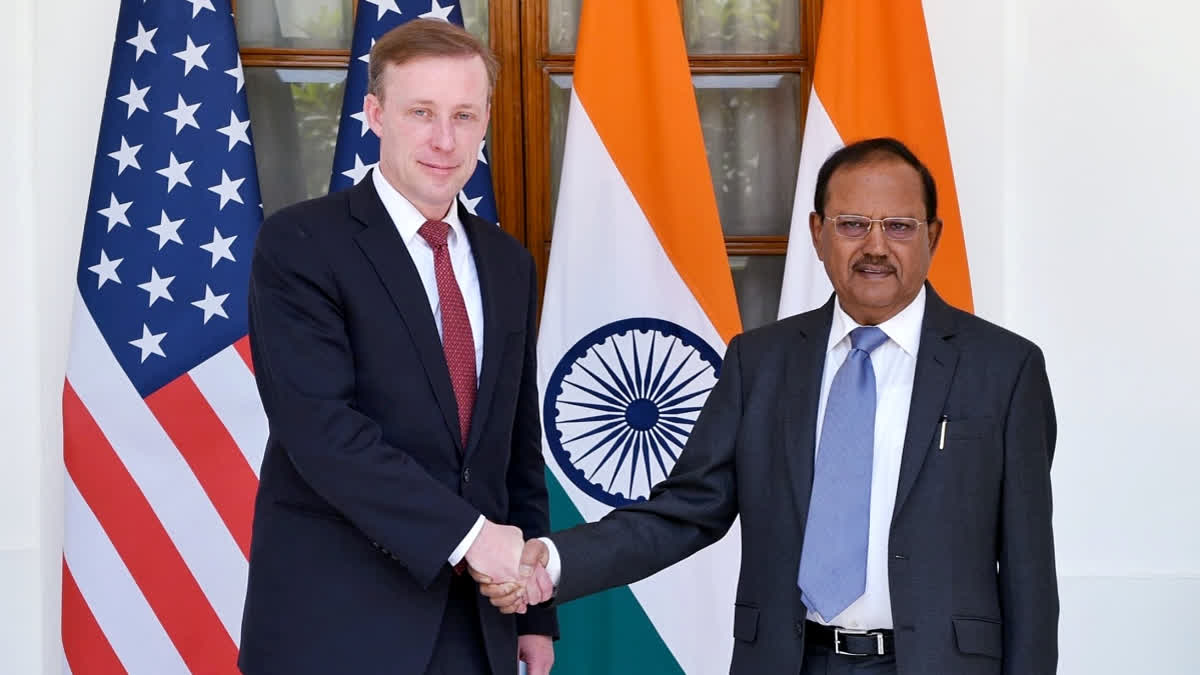Washington: The White House said on Friday that outgoing US National Security Advisor Jake Sullivan will travel to India on January 5 and 6 to meet his counterpart Ajit K Doval and other top government officials for a final round of talks on a wide range of bilateral, regional, and global issues and to finalise some ongoing initiatives that were important priorities for them to wrap up.
Sullivan, 48, the youngest national security advisor when President Joe Bident appointed him on January 20, 2021, would also deliver a major India-centric foreign policy speech at IIT, New Delhi during his last trip to India before leaving office. Congressman Michael Waltz would succeed him on January 20, when Donald J Trump would be sworn in as the 47th President of the United States.
While there, the main purpose will be a capstone engagement and dialogue with his counterpart, National Security Advisor Ajit Doval, a senior administration official told reporters during a conference call Friday afternoon. It will cover a range of issues across the breadth of our partnership.
Still, with a specific focus on the strategic technology cooperation that we have had across a range of domains, from defence to space to artificial intelligence, the official added.
“The two national security advisors during this engagement will not only take stock of the progress that we have made over the last four years, which has been a historic and transformative period in this relationship as well but also continue to finalise some ongoing initiatives that were important priorities for us to wrap up to continue our technology cooperation through the end of the administration and to identify new opportunities that we hope with an upcoming team, will continue to take forward,” said the official who spoke on the condition of anonymity.
From the views of the Biden administration, the US-Indian relationship has not only been one of the bright points and a real foreign policy prairie and area of legacy achievement for the Biden administration, but it is also a relationship where they have seen continued bipartisan support and momentum from administration to administration in the United States, said the official.
Sullivan will deliver a speech at IIT Delhi, in which he will emphasise how India is central not only to US priorities in the Indo-Pacific but globally. “We see this as a partnership that is not subject to huge partisan swings in the United States but has had an enduring basis of support that we expect will continue to move forward,” said the official.
During the visit, he will also meet External Affairs Minister S Jaishankar, as well as other Indian leaders. The US delegation led by Sullivan will also have members from other government departments.
“While we are there, we will have the opportunity to meet with business leaders as well as young entrepreneurs in India, and emphasise how much the progress that we have made in this relationship under the Biden administration is not only due to the work that has been done at a GOV to Gov level, but I think increasingly, due to the fantastic and strong relationships that exist at the people-to-people level, at company-to-company level, between the United States and India,” said the official.
“Overall, the message that we intend to leave with at the end of this trip is one of real gratitude for the friendship and the close partnership that President Biden and Prime Minister Modi have enjoyed over the last four years, but also one of tremendous optimism because we see a lot of opportunity in the future for the things that we have started with over the last four years, whether that is commercial space cooperation, looking at opportunities in the future for civil nuclear cooperation, more cooperation on green energy technology.
"We think all of these are poised, really, for exponential growth in the future. We are proud that the Biden administration has put down such a solid foundation and made further growth possible,” the official said. A second senior administration official told reporters that for this particular trip, Sullivan will be taking up several issues.
First, advancing the civil nuclear partnership, looking at ways how they can advance cooperation around small modular reactor technology and other forms of civil nuclear cooperation.
Second, address the People’s Republic of China's overcapacity, whether talking about legacy chips or biopharma supply chains and also aligning strategies on ICT risks and cyber-focused technology protection measures, whether talking about connected vehicles or the just announced investigation into Chinese drones.
Third, discussions around artificial intelligence and national security following the conclusion of their national security memorandum on AI and other regulations.
Fourth, promoting the new commercial space cooperation as the US finalized amendments to its own Missile Technology Control Regime for licensing policies. Fifth, unlocking funding for US India R&D partnerships under the university-based local challenges institute, the second official said.



